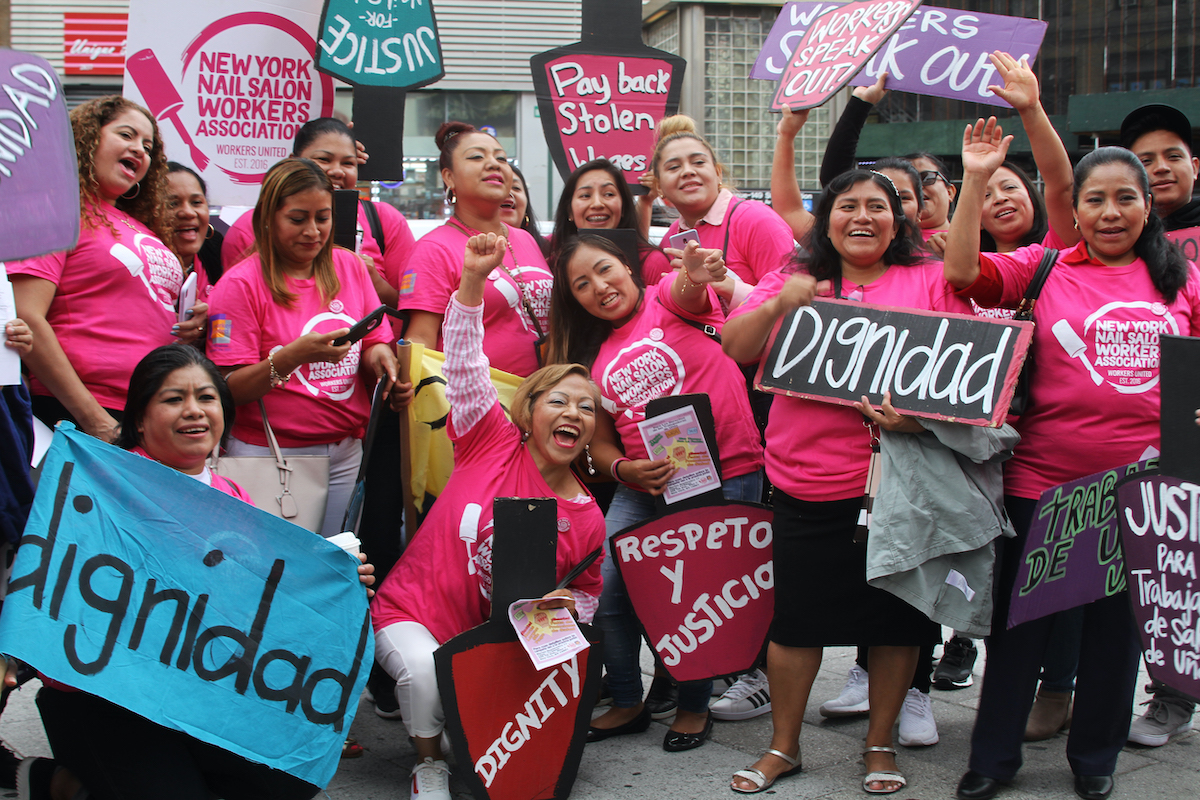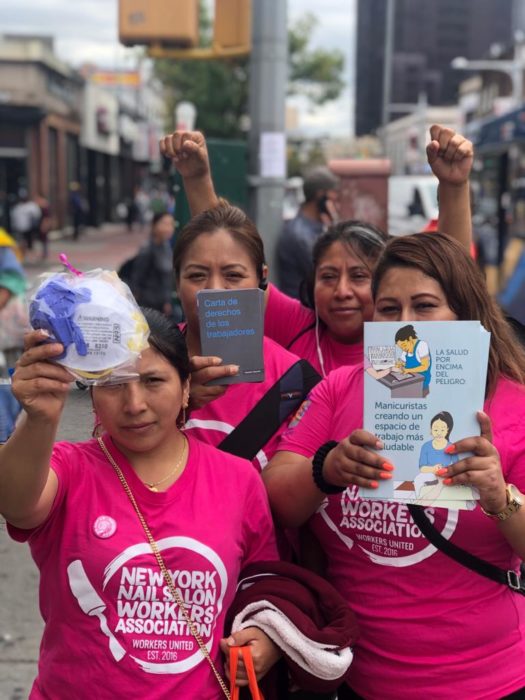

A group of nail salon workers from the NY Nail Salon Workers Association rally in Albany for the Nail Salon Accountability Act in February 2020. (Photo via the NYNSWA)
In February of 2020, María Hernández was rallying for improved working conditions with nearly 100 of her fellow nail salon workers on the steps of the New York State Capitol. Fresh off of a 2019 victory aimed at ending the industry’s subminimum wage, the workers’ demands for better accountability and enforcement seemed within reach.
Less than one month later, everything changed. Wages were rendered irrelevant as work itself came to a standstill. Hernández, a nail technician for the past 16 years, suddenly lost her job, as COVID-19 shuttered nail salons throughout New York City.
“The city was abandoned,” said Hernández, 38, who is originally from Mexico and did not qualify for public relief due to her immigration status. “Everything was closed and we didn’t know when we would be able to work again.”
With many nail salon workers in the same position, the NY Nail Salon Workers Association (NYNSWA) —a worker-led initiative that Hernández is a member of— rushed to pivot to direct relief for its members and away from the political advocacy campaigns that had been their focus before the pandemic. Now, looking beyond the crisis, leaders see an opportunity to reimagine the industry by fighting wage theft and subpar working conditions.
Pivoting to Direct Relief
NYNSWA was founded as a project of the New York-New Jersey Regional Joint Board, Workers United, Service Employees International Union (SEIU) in 2016. The group strives to improve work and safety conditions in NYC’s over 4,000 nail salons through legislation and worker organizing.
Most of the state’s 30,000 nail salon workers are Asian and Latina immigrant women, but most of NYNSWA’s over 800 members are Latinas, who faced the country’s steepest job losses in the pandemic’s early months and who tend to be the least well-paid in the industry hierarchy.
Cecilia Guzmán, 33, became a member after receiving her nail technician license through the group in 2018. When she and her husband both lost their jobs last March, she turned to NYNSWA for support. Like more than four in five members, Guzmán had not qualified for any government relief.


Cecilia Guzmán, a nail salon worker in Queens, NY and a member of the NY Nail Salon Workers Association. (Photo courtesy of Cecilia Guzmán)
“The association was the only one who offered us support and I’m very grateful for that,” said Guzmán, who received $1,450 from the group’s Nail Salon Worker Resilience Fund. NYNSWA also formed part of the campaign behind the state’s $2.1 billion Excluded Workers Fund, which will provide retroactive financial assistance to undocumented New Yorkers.
‘An Economy of Survival’
As salons reopened, Hernández, an NYNSWA worker-leader, continued her advocacy work by educating other members on their rights.
According to Hernández, the group, which she first encountered through its licensing program, has “become a little family,” since so many members share similar experiences. “Even though there’s 800 of us, we still feel like we all know each other and we support one another.”
When she first entered the industry in 2005, Hernández earned only $25 per day. Despite state regulation efforts after a 2015 New York Times exposé revealed widespread malpractice, 82% of workers continued to experience wage theft, or the failure to pay full wages to which workers are entitled, in 2020.
The rally in Albany last year was to support the Nail Salon Accountability Act, a bill that would tie nail salon licenciature to labor law compliance. When the pandemic hit, it stalled in committee, as both advocates and policymakers turned their focus to crisis relief. Since then, Assemblywoman Catalina Cruz (NY-39), who first introduced the bill in 2020, says that workers have become even more vulnerable, given the pandemic’s toll.
“Now that everybody is in an economy of survival, [workers] might feel forced to take jobs that endanger their health and don’t pay, simply because they need a job. They need to feed their families,” said Cruz. In January 2021, Cruz reintroduced the bill and it is currently in committee in both the Assembly and Senate.
Beyond the Pandemic
As New York City slowly recovers, Clara Wheatley-Schaller, Political Coordinator for Workers United, says it’s the perfect time to reimagine the future of the industry
“Just like a lot of New York’s economy has to be rebuilt, the nail salon industry is going to have to be rebuilt,” she said. “We really see this as a unique opportunity to think about what kind of industry we want to have and what kind of industry is going to be best for workers, customers, and employers.”


Members of the NY Nail Salon Workers Association hold up masks and health information for workers in February 2020. (Photo via the NYNSWA)
In addition to advocating for the Nail Salon Accountability Act, the group also supported the recent passage of the NY HERO Act, intended to improve workplace protections against infectious disease.
Although many salons reopened in July of last year, more than half of NYNSWA’s members remain out of work, including Hernández. As the nail industry—and the city—recovers, she hopes that by the time she’s back to work, the salon will be a safer and fairer space for workers.
“I love my work, but I also want to live well. I want my job to give me a good life,” she said. “The love that we have for our work doesn’t mean that we need to accept poor conditions.”
***
Sara Herschander is a freelance journalist and current master’s student at the Craig Newmark Graduate School of Journalism at CUNY. She lives in Queens, NY. Twitter: is @SaraHerschander.


